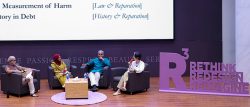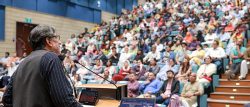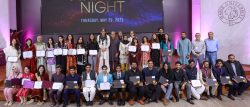On 5th September 2024, Habib University proudly inaugurated the world’s first Lady Fatima Endowed Faculty Chair in Women and Divinity. Housed within the Comparative Humanities program, the Chair represents a significant step forward in the study of women’s roles and the feminine aspects of divinity across diverse religious traditions. As Pakistan’s leading liberal arts and sciences university, Habib University seeks to promote in-depth research and global discussions on these essential yet often overlooked topics.
Lady Fatima Endowed Chair: A Reflection of Habib University’s Mission
The establishment of the Lady Fatima Endowed Chair in Women and Divinity — the first of its kind in the world — addresses critical gaps in understanding women’s roles in society through religious traditions. The endowment of the Chair is made possible by Mr. Abbas D. Habib family, in the memory of (Late) Zainab Dawood Habib.
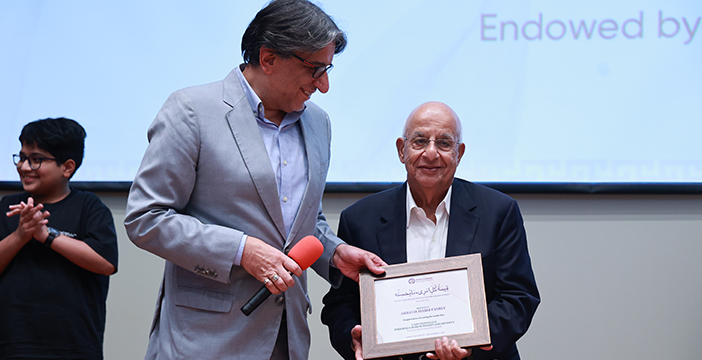 President Wasif Razvi remarked, “Endowing a faculty chair with such a unique perspective shows strong resonance with Habib University’s distinct mission of crafting a thoughtful educational experience for our students from all backgrounds.”
President Wasif Razvi remarked, “Endowing a faculty chair with such a unique perspective shows strong resonance with Habib University’s distinct mission of crafting a thoughtful educational experience for our students from all backgrounds.”
This initiative comes at a time when the world is grappling with critical societal issues, including gender inequality, climate change, and ecological challenges. Climate change, in particular, exacerbates the difficulties faced by women in their daily lives.
The vision behind the Chair aligns with Habib University’s reparative approach to education, which seeks to heal and repair our damaged world through informed dialogue and scholarly study. By focusing on the often overlooked contributions of women in religious contexts, the Chair seeks to advance scholarly study on the role of women and the feminine aspects of divinity in the Muslim tradition, as well as other faiths.
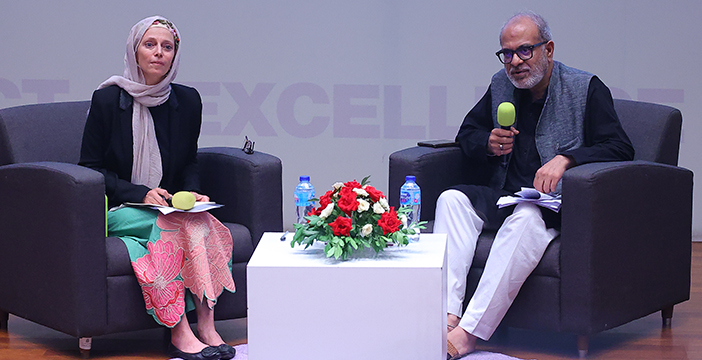 Dr. Nauman Naqvi, Associate Professor Comparative Humanities at Habib University, stated in his opening remarks, “There is a globally recognized need for a focus on women and their extraordinary potential in religion and spirituality, and it is indeed a growing field that has produced some of the best scholars and scholarship over the past few decades.” He expressed gratitude to the Abbas D. Habib family for this visionary initiative, paying tribute to their insight and vision.
Dr. Nauman Naqvi, Associate Professor Comparative Humanities at Habib University, stated in his opening remarks, “There is a globally recognized need for a focus on women and their extraordinary potential in religion and spirituality, and it is indeed a growing field that has produced some of the best scholars and scholarship over the past few decades.” He expressed gratitude to the Abbas D. Habib family for this visionary initiative, paying tribute to their insight and vision.
Inauguration: A Historic Moment for Women and Divinity Studies
The Lady Fatima Endowed Faculty Chair was officially inaugurated on September 5th, 2024, with an introductory lecture delivered by Dr. Larisa Jasarevic. An independent scholar from Bosnia, Dr. Jasarevic’s research interests span climate ecology and the metaphysics of the heart. She is also an anthropologist, beekeeper, hobbyist photographer, and filmmaker. She taught at the University of Chicago and was a visiting scholar at the Max Planck Institute for the History of Science in Berlin.
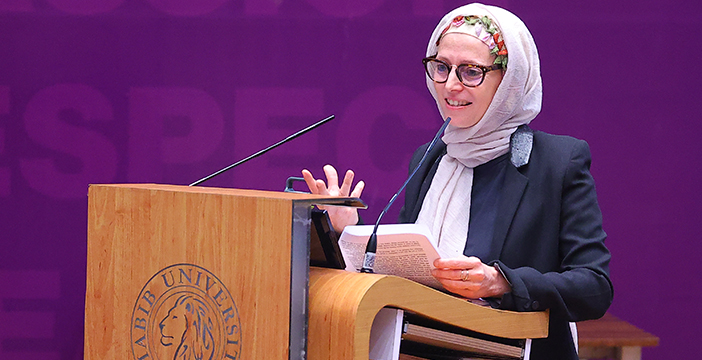 Dr. Jasarevic’s inaugural talk, titled “Thinking on the Tattered Planet: Ecostress, Religion, and the Gender Quarrel,” centered on themes of life sciences, religion, and gender dynamics amidst ecological stress facing the planet. Drawing on her extensive research, she highlighted the significance of Prophetic teachings on sustainable living in contemporary efforts to build a more equitable and sustainable world.
Dr. Jasarevic’s inaugural talk, titled “Thinking on the Tattered Planet: Ecostress, Religion, and the Gender Quarrel,” centered on themes of life sciences, religion, and gender dynamics amidst ecological stress facing the planet. Drawing on her extensive research, she highlighted the significance of Prophetic teachings on sustainable living in contemporary efforts to build a more equitable and sustainable world.
Her latest book, Beekeeping in the End Times (IUP, March 2024), explores how the anthropological study of bees can articulate our understanding of climate crises, further showing how traditional practices can inform modern approaches to environmental and sustainable living.
Dr. Jasarevic, in her lecture, emphasized the importance of deriving spiritual and practical guidance from the lives of revered Islamic figures, particularly Hazrat Bibi Fatima (AS), and discussed its significance in exploring new pathways to address modern-day challenges. She notes, “Now that we’re all eco-stressed, seeking help from the Prophet and the Ahl al-Bayt is a way of revitalizing tradition, a way of making it vital to climate action.”
Comparative Humanities: Interdisciplinary Learning to Address Global Challenges
Habib University’s Comparative Humanities (CH) program empowers students to tackle global challenges by integrating the study of history, literature, philosophy, and religion. This interdisciplinary approach equips students with intellectual tools to address complex issues in areas like gender, ethics, and ecology.
The Lady Fatima Endowed Faculty Chair is positioned in the CH program and institutionalizes the study of women’s roles and the feminine aspects of divinity within religious contexts. The Chair aims to promote discussions that honor the contributions of women across various spheres.
During her inaugural lecture, Dr Jasarevic highlighted a critical issue: “Hard sciences receive 770% more funding for climate research worldwide than humanities and social sciences. Yet, how do we effectively use this growing knowledge of climate change?”
She further elaborated, “Acting at the very least presumes major changes in thinking, doing, spending, valuing — in short major changes in the modern ways of being and living. Now all these ways can only be grasped, and figured out with the help of social sciences and humanities scholars.”
This highlights the critical need for programs like Habib University’s Comparative Humanities that offer a unique and interdisciplinary approach to education. By integrating diverse perspectives, our CH program allows students to approach global challenges such as the climate crisis from a multidisciplinary lens.
The Lady Fatima Endowed Faculty Chair reinforces this approach in conversations on women and divinity, setting a global precedent focusing on subjects that have long been overlooked in academic and religious circles.
Global Significance of the Lady Fatima Endowed Chair
Women in Pakistan and globally often face systemic marginalization in various areas of society. While there is extensive research in areas related to women and gender studies, there is a critical need for diverse perspectives to truly understand the intricacies of gender issues, especially the connection between women and spirituality. This connection is often neglected or misunderstood in societal and religious settings.


